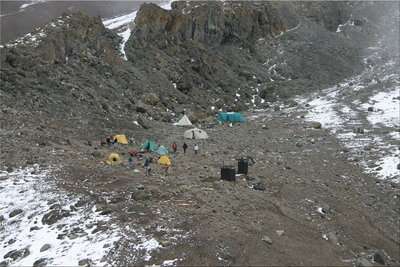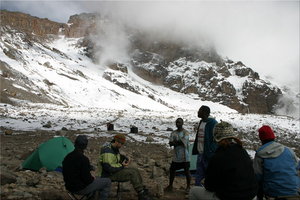
We assemble our packs, and watch the porters break camp as everyone gets ready to hike up the trail with Chombo and Luckas. We reach Arrow Glacier campsite just as the clouds roll in for the day.

|
|
This is looking pretty hardcore: Arrow Glacier campsite seen from a nearby pinnacle
|
I am still using my heavy, rubberized cloth air mattress. I've had to combine it with the foam sleeping mats supplied by Zara for warmth because by itself it does not insulate against cold. I have no pump, and at sea level it takes me about 75 deep breaths to fully inflate it. There had been a debate about the wisdom of bringing this into such thin air, where breathing is hard enough as it is. Fear unfounded. It still takes 75 breaths and less than 10 minutes to blow up.
Tea is served, on the card table and chairs carried all the way up here on porters' heads for this purpose. I skip, for the usual reason.
I am breathing comfortably here at 16,100 feet, but get out of breath if I walk uphill at all. I wonder about anaerobic performance. Is it affected? To test, I sprint uphill until my strength runs out, and it seems normal. Only one problem, such an exertion renders you out of breath at sea level. Here I cannot get enough oxygen even desperately gasping, and my chest starts to hurt and I think oh no, I'm going to faint in a second. But some pressure breathing (exhaling through pursed lips) helps me recover. This is a bit frightening. Andrew and Peter think it is a hilarious, classic Markus maneuver, and would I please repeat it for the video camera? Sorry. A plaque on the rock where I ran out of breath says that an American died here in 1972. Cause of death not given.
A man is making the rounds, comparing notes. He is from Greece, and has already summited Mt. Kenya a few days earlier, and laments how slow his guide and his climbing buddy (who he met here in Africa) are. He would prefer to do the whole of Kilimanjaro at his own pace and without a guide. I wonder how fast he will be. He certainly seems to have no altitude problems.

|
|
Pre-summit briefing against an impressive backdrop
|
Then we assemble our summit packs. For Andrew and me this involves going through all our stuff and making "take" and "leave" piles. The summit packs end up fairly heavy because of all the warm clothing, water, and the ice axe and crampons. My confidence comes and goes; one moment this whole thing just scares me, the next moment I feel "bring it on!".
I run out of water around 3pm, and don't successfully communicate to our support staff that I need more (they supply all drinking water, boiled for safety and then cooled). So I don't end up drinking anything before bedtime, which is before it gets dark because we will get woken up at 11pm. Sleep does not come right away because others in the camp site don't go to bed so early and continue talking. I do eventually get a few hours. I have taken a Diamox prophylactically and will take another one the next day, on the assumption that they help me.